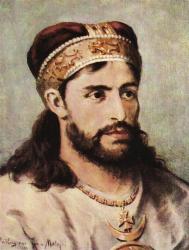He’s a Slavic import with a certain dashing style.
Thanks to Larkin for suggesting Casimir as our Baby Name of the Day.
Casimir comes from two apparently contradictory elements. Mir means peace, but kazic means to destroy. The original sense is probably something like “one who destroys the peace of his enemy,” but modern parents could focus on the peaceful part.
You can hear both French and Polish pronunciations here. In English, kaz EH meer is probably closest.
Polish kings, nobles, and a saint have answered to the original form of the name, Kazimierz. Neighbors in Pomerania had adopted it by the twelfth century, but it would be centuries until he reached Western Europe.
The quartet of Polish rulers make for a relatively admirable bunch. Casimir III established the Jagiellonian University in Cracow in the 1300s, the oldest university in Poland and among the oldest in the world.
But perhaps Casimir IV’s son – the future saint – is the one that helped the name spread. He was expected to inherit the Polish throne, and even served as vice-regent in his father’s absence. But Casimir wasn’t willing to marry, and spent much of his time fasting. He died in 1484, while visiting Lithuania. He’s the patron saint of Poland, Lithuania, and youth.
A German prince is called Johann Casimir in the late 1500s, and over the next few hundred years, the name goes global:
- Spanish-born Casimiro Diaz evangelized the Philippines in the early eighteenth century.
- He’s also found in France by the eighteenth century, where Casimir, Comte de Montrond, was involved in various diplomatic affairs.
- Born Louis-Casimir Escoffer and known as Casimir Ney, the nineteenth century French composer was a master at viola.
- Casimir Dudevant was the French nobleman best known for marrying Aurore Dupin – the future George Sand.
- Count Kasimir Felix Badeni was a Polish aristocrat, who played a key role in administering the Austro-Hungarian Empire administration, though he was not particularly adept at his work.
- Casimiro de Abreu was a Brazilian-born poet who flourished in Portugal in the mid-nineteenth century.
- Casimiro is also in use in Italy around the same time, with a powerful Italian-born cardinal called Casimiro Gennari.
- Jean Casimir Guyon was a French surgeon and pioneer in urology in the early years of the twentieth century.
Casimir had a good run in France, peaking in the 1930s. But in the 1970s, an orange dinosaur called Casimir dominated children’s television. Just like Barney struggles to overcome his associations with a purple T-Rex in the US, I suspect it has put a damper on the name.
In the US, Casimir appeared at the fringes of the Top 1000 into the 1930s, but today is simply unknown.
Short form Cass leans a little girlish, though Cas, pronounced Kaz, is almost cowboy. And if you think you’re likely to use all three syllables, just like so many kids called Sebastian and Isabelle do, then there’s no barrier to Casimir. It’s a great Slavic option with plenty of history and style.





I’ve always loved this name, but the meaning put me off. But at least in Czech (not sure about Polish), they say that alternatively the “Cas/Kaz” part can be the base of the word to preach, (kázat), making the meaning “one who preaches peace (peacemaker).” So it could mean either “one who (may) disturb the peace” or “one who preaches peace” (“ten, kdo káže mír”).
I love the peacemaker meaning!
I just saw this on a new baby who has a Polish dad – I think it’s soooo handsome and strong, and Cass and Caz would be awesome nicknames.